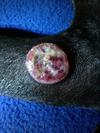Common Labrador Health Problems and Concerns
Luckily, Labrador health is something of an enigma for a breed that is renowned as both a lively and boisterous pet and a hardworking dog. A Labradors constitution, good or otherwise, is often the product of the Lab's family tree.
If you have a Labrador health question, just ask and we'll answer it for free. Just fill out the form on the bottom of this page. Commonplace Labrador retriever health problems include
- hip and elbow dysplasia
- hereditary myopathy: a disease which effects the muscles
- luxating putella which leads to the leg appearing bow shaped
- ear infections including inner and middle ear infections
- eye problems
- canine cataracts
- progressive retinal atrophy
There are however certain conditions which do tend to effect labs and you can read about the three main areas of concern on our page about Labrador Retriever health.
Labrador Retriever Skin Problems
There are several types of Labrador skin problems including:
- Acral lick dermatitis: a lic granuloma (LG) is a common condition where repeated licking causes the deveopment of a raised skin nodule. The problem commonly occurs on back of the front limbs or the tops of the back limbs. The dog licking is often caused by a food allergy, seasonal allergy (atopy) or food sensitivity. Click here for more on dog allergies
- Acute moist dermatitis (dog hot spots): this occurs due to self trauma (scratching, licking) in response to a dog skin problem such as allergy
- Atopy (seasonal allergies such as pollen): allergy due to an inhallant such as hay fever.
- Folliculitis: inflammatory reaction in the hair follicles
- Lipoma: a benign (not cancerous) skin tumor
- Seborrhea: an increase in skin scaling
- Otitis Externa (dog swimmers ear): inflammation in the external outer ear

Labrador health concerns include skin problems such as this Lab with atopic dermatitis, a seasonal allergy caused by inhaled allergens such as pollen
Source: Washington State University
Labrador Stomach Health
A serious stomach problem among Labradors is gastric torsion otherwise known as bloat.
This condition appears when the stomach becomes twisted, trapping undigested food and gases. This leads to a rapid swelling in the abdomen and cause serious pain and death if not immediately treated.
Labrador Cancer
Another threat to Labrador health is the dreaded disease of cancer which is an increasing problem, threatening the lives of even younger labs.
Other labrador health and cancer related problems to watch for are osteosarcoma which is a malignant (cancerous) bone tumor and pancreatic cancer.
In unspayed females, beware of problems such as dog breast cancer. Palpitate the mammary glands of your dog for small pea size lumps if this is of concern.

Other Labrador Health Problems
Other labrador heath problems include epilepsy, osteoarthritis - prevalent in older dogs, heart disease and diabetes (also see our information on a diabetic dog food and diabetes in dogs. Many of these diseases are associated with the breed's propensity to put on weight.
Obesity is the cause of many Labrador health problems and can be avoided by feeding your Lab a healthy diet and allowing it plenty of regular exercise.
Many problems, such as myopathy, are inherited, the product of over breeding down the years, so when acquiring a Lab, it is crucial to buy from a breeder who is able to check for inherited disorders.
Labrador Behavior
One thing that many of us worry about is leaving our Labs home alone. For more information on this see our page on Separation Anxiety In Dogs.
Labrador Retriever Lifespan
By the way if you are concerned with how long your Lab will be with you visit our Labrador retriever lifespan page for some reassurance.
Labrador Disease Prevention
Obviously precautions need to be taken against the puppy contracting some of the more awful diseases and this includes vaccination. Your Lab puppy simply must be given vaccines. For more information visit our page on dog vaccinations.
As with any breed of dog prevention is always better than cure. That means regular exercise as well as regular check ups at the vets. As well as giving a thorough examination, the vet will also immunise your Lab against heartworms and fleas. For information and advice of finding the right health care provider for your dog see our page on choosing a vet.
Veterinary fees can be expensive, but prevention is better than cure in negating possible problems with your dogs health. But, it is of course essential that you use the services of the best vet for your Lab. Also consider low cost pet health insurance, such as policies offered by Pets Best.
Taking the time and effort to find a reputable breeder, who cares and is knowledgeable about the breed and checks his labs for genetic defects before breeding should ensure that you buy a healthy pup, and one that should be free from serious ailments throughout most of its life.
Also, it must be stressed that no Labrador puppy should be brought home until it is at least seven weeks old.
Despite concerns about the health of Labrador Retrievers don't be concerned if your puppy appears hyperactive. It is merely demonstrating the boisterousness and love of playing that is associated with the breed.
Labrador Age Calculator
Following the same theme, to work out your dogs age in human years you can visit our Dog Years Calculator and our guide to Labrador Retriever life expectancy.
Have A Labrador Retriever Health Question for our Veterinarian?
Do you have a Labrador Retriever health question? We'll answer it for FREE! Just fill out this form and our Vet will get back to you as soon as possible.
Please include information such as the sex, medical history, medications, changes in behavior, when symptoms first appeared and anything else you believe would be helpful. Please send a picture, particularly if the problem is skin, eye or ear related.
Questions are answered on a first come, first served basis and may take some time depending on the number we receive. If you have an urgent question, we suggest using this low cost online veterinary question service that has Vets standing by 24 hours a day, 7 days a week.
What Other Visitors Have Asked our Vet
Click below to see contributions from other visitors to this page...
Why Is My Dog Losing Hair? 




Reader Question : Reasons for Dog Hair Loss
My 13 year old Labrador has been losing extremely large patches of hair with a crust at the shaft of the …
Treating a Swollen Red Hairless Dog Skin Bump 




My male lab is not nuetered, is about 75-80lbs and is 1 1/2yrs old. He got this red lump on his inner right back leg He kept licking it and the bigger …
Dog with High White Blood Cell Count 




My 8 year old chocolate lab is our 3rd child. We have had her since she was 8 weeks old so this is so difficult.She has labored breathing, loud breathing …
Dog Coughing Problem in Lab 




Yesterday my Lab started getting the dry heaves. She acts like she's trying to cough something up, but nothing comes up except some white liquid - like …
Help for a Nervous Lab Not rated yet
Hi I have a black Labrador, he's 13 years old well looked after. He has always gone everywhere with us not frightened of anything. But now he is scared …
Causes of Dog Sudden Death Not rated yet
This is a little late, due to my dog Lucky passing away yesterday. My family and I had her for 10+ years. She was always so full of energy, whenever i …
Treating Blood in Dog Urine and Large Skin Lump on Hip Not rated yet
My dog Scarlett is 14 and I just notice this morning that her urine is bloody and she all having problem getting up and down. Her nose is also warm. She …
Diagnosing Canine Skin Lumps on Older Dog Not rated yet
My lab is a 13 year old bench black labrador retriever. He has large lumps all over him. One is larger then a softball. I noticed his vocal is not so …
Labrador and Canine Arthritis Not rated yet
I have a chocolate lab. he is 19 and will be 20 in December. He has arthritis, weighs 80 lbs. and he takes 100mg of capprofen once daily.
Lately he …
Labrador Dog Eye Allergy Diet and Treatment Not rated yet
My 3 yr old chocolate male lab has allergies and digestive issues. After about 1 1/2 yrs I got him squared away with simple salmon formula Wellness dry …
Dog with Change in Character Not rated yet
I walk our neighbors yellow Lab every day and he is usually so excited when I arrive, he almost knocks me over. He usually "trots" at a fast pace, up …
Dog Crying in Pain Not rated yet
My Labrador dog is salivating and cannot get comfy and is crying as if in pain. This has only just started tonight. How can I make my dog more comfortable, …
Treating Dog Cluster Seizures Not rated yet
Is it common for black labs to have cluster seizures and how can we prevent them? Poor girl has one every three to four months gets rigid muscle spasms, …
Dog Nose Irritation Not rated yet
My yellow lab sometimes has slight bleeding on the top of her nose - like that you would get from a slight scrape or abrasion.
This sometimes happens …
Information on Other Labrador Health Concerns
Labrador Retriever Reproduction Problems
Labrador Hip Score
All About Dog Pregnancy
Protect Your Puppy From Parsites
Dog Worms
More on Dog Worms

